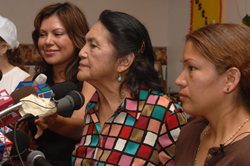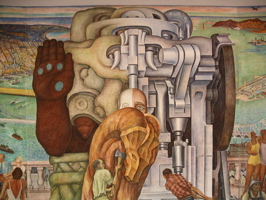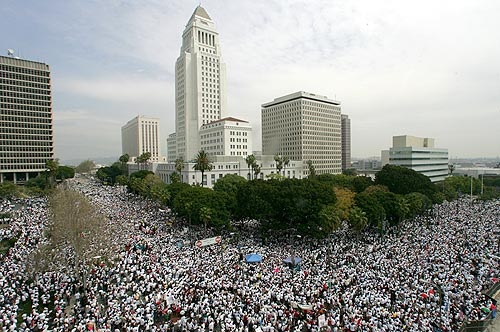|
SOC 335 Fall 2008     
     |
|
SOC 335 Fall 2008     
     |
TEXTBOOKS
This course explores the historical
sociology
of Latino peoples in the United States through four distinct and
dramatic -
albeit incomplete - topics: First,
we look at present-day Puerto Ricans, both in Puerto Rico and in the
United States; their ambiguous, unresolved political status; their
social and cultural hybridity; their migration experiences. Then we
embark in a case study of the social construction of Latinos as a
"race" in the era of the Monroe Doctrine: the racialization of Mexicans
and Mexican-Americans in the U.S. beginning and after the war-driven
annexation of northern Mexico into the United States in the second half
of the 19th. Century - an intertwined story of empire-building,
nation-building, and ethnogenesis. The third topic of the course will
be the profoundly inter-related experiences of Mexicans in both Mexico
and the United States in the 20th. Century, from the perspective of
the ever-more integrated political economies of both countries, but
with the peculiarity that one, the U.S., became the global hegemonic
power of the world-economy, while the other, Mexico, could not escape
its increasing dependency to the U.S., despite a social revolution and decades of attempting
national developmental models. This led to the world's longest-running,
largest-scale, continuous, informal ("illegal") & formal ("legal")
labor migration flows, with major consequences to both countries,
including a deepening of Mexico's dependence and the dramatic growth of
the Mexican-American community in the U.S.. The last topic will focus
on the ongoing
resurgence of racism and xenophobia against Mexican
undocumented immigrants, at the grassroots and state levels, having
become the central racialization phenomenon in the
United States in the early 21st. Century, as well as the public
political emergence of a
mighty immigrant rights movement since 2006, with far reaching
implications.
The course will be run mostly as a
seminar. Students will form ten groups ("grupos") of up to four students
each, and, after the first week of class, will take turns introducing
and analyzing the assigned readings for each session, followed by class
discussion, with Dr. Santos participating. That way each student will
make two class presentations during the quarter.
Attendance is mandatory (please, no tardiness or early departures, as
these will be penalized). All students must come prepared to discuss
the readings - either through their formal presentations, or, when they
are not presenting, by bringing to class their reading assessments.
The reading assessments must be turned in to Dr. Santos at the
beginning of each class session. (No late submissions will be accepted)
The students will also collaborate within their groups to produce a
research project on topics related to the Latino experiences in the
United States -- each student will therefore also write a research term
paper.
Class
Presentations: At the
beginning of the course, the students will be organized in groups of
three. On those dates identified in the schedule below, groups
will make PowerPoint presentations on the assigned readings -- groups
can expect to present twice in the quarter. Class discussion will
follow the presentations. Please email Dr. Santos an electronic
copy of your presentation. Time allotted per individual presentation
will be 6 to 8 minutes. Each presenting student will introduce,
describe, highlight, and summarize his/her own portion of the assigned
readings, and raise one relevant, interesting question for subsequent
discussion. As a precaution, please bring your presentations in a
USB-type memory stick and also email it to your own Runner email
account. When it's your turn to present, please show up early to set it
up & test it. It is each group's responsibility to organize the
division of labor in their presentations so that there will be minimum
overlap between them.
The presentations will be graded based on: (a) the analytical strength
of the presentation, including its depth & breath (how well it
covers all the main aspects), (b) critical thinking and originality,
(c) the relevance and thought-provoking quality of the question posed
at the end, and (d) the delivery & style of the oral presentation
(including the visuals displayed).
Reading Assessments: To ensure that everybody come to every
class prepared to discuss the assigned readings, students who are not
presenting must bring to class one written "reading assessment" per
chapter assigned, each up to two pages in length, double-spaced text. Dr. Santos will randomly select a couple
of students to read their assessments and/or questions in the
discussion periods. No late reading assessments will be
accepted, unless the student has a pre-authorized absence from Dr.
Santos. DO NOT SEND YOUR READING ASSESSMENTS BY EMAIL.
CONTENT: Please always write on top of your
reading assessments your name, the date, and the reading you are
assessing. In contrast to the presentations, these
"reading assessments" must not
summarize or describe the readings, but must critically respond to them: express what the you think about them; identify the
areas of strong agreement and
disagreement with the author, explaining why you do, as well as
the areas or topics you find most
interesting to discuss, or anything in particular that impressed you greatly, caused you confusion, or surprise. Whatever you write, you
should explain your specific academic and/or personal reasons for doing
so. The reading assessment cannot and should not cover every issue found in the assigned
readings for the day; you must be selective and demonstrate judgement
in the choices you make to discuss (by the way, early topics are always
suspect!). A very bad assessment will reveal the student read very
little or very superficially just to do the assignment (it's called
"going through the motion"). A good assessment will demonstrate the
student really read the material and did a serious effort to select and
critically grapple with some of the main issues raised. At the end of
each reading assessment, students should always write their own
question for class discussion.
Note: Students
presenting on a given day do not need to submit any reading assessment.
Research Papers: Students
in each grupo will also be asked to chose a
pertinent historical/sociological topic relating to the Latino
experiences in the United States, and design, organize, and carry out a
written group
research project on it. The selected subject may be panethnic
(all
Latinos) or ethnic (one Latino ethnic group); it might focus on
the immigrant and/or
the U.S. settlement
experiences; the period
covered may be historic (19th., 20th. centuries), or contemporary
(1990s to now); the spatial dimension may be as small as a city
or local area, a state,
a region of the U.S.,
or as large as the entire North America &
Caribbean area; the topics may focus on the social, political,
economic, demographic, and/or cultural
conditions,
trends, institutional dynamics, or social movements, or burning issues
affecting Latinos
or affected by them (health, education, political participation, etc.).
There are literally hundreds of
interesting topics - brainstorm! The students must obtain approval from
Dr. Santos
for both their overall grupo topic and for their individual
subtopics no
later than October 31.
Grupo
delegates may visit Dr. Santos at his office during his office hours
posted above.
Extra Points: Perfect attendance will be rewarded with up to five extra points. Another way to get extra credit is to attend those campus or public events Dr. Santos announces in class and write a two-page report on each of them. Another way is this: there are two general studies courses that students are strongly encouraged to take if they wish to develop their research skills, and if they do (either or both) will receive extra credit in this course: These courses will enable students to develop the necessary competencies to navigate their way around the complexities of researching print and electronic sources. For further information contact librarian Christy Gavin (email: <cgavin@csub.edu>, phone: 661-664-3237).
Plagiarism: To prevent students from wittingly or
unwittingly engaging in plagiarism, Dr. Santos strongly recommends
students to carefully read and abide by the document CSUB
Classifications of Plagiarism found at:
http://www.csub.edu/tlc/options/resources/plagiarism/4plagiarimclassifications.htm.
Furthermore, students are advised that all papers will be submitted to
TurnItIn.com, a professional web site now routinely use to quickly
detect plagiarism. Anyone found guilty of engaging in plagiarism will
automatically fail the course and be reported to the Office of Student
Discipline and Judicial Affairs for further disciplinary action.
Grading:
Each grupo class presentation is worth 20 points each
(15
points for the individual oral presentation, 5 points for the overall
group
effort). The research project is worth 30 points (35 points for the
individual
paper, and 5 points for the quality of the conceptual and physical
organization of the grupo volume as a
whole). The reading assessments are worth the remaining 30 points. The
extra credit students may
receive for
taking the suggested General Studies courses will depend on their final
grade in those courses, and may range from zero to six points (up to 3
extra points
per course). Perfect attendance will also be rewarded with five extra
points; absences and tardiness/leaving early will be penalized with one
point off per instance. The final
letter grade will be assigned, on a scale of 0 to 100, as follows:
| 94-100 = A | 87-89 = B+ | 77-79 = C+ | 65-69 = D |
| 90-93 = A- | 84-86 = B | 74-76 = C | < 65 = F |
| 80-83 = B- | 70-73 = C- |
Office Hours & Private E-Mail to Dr. Santos:
All students are encouraged to visit Dr. Santos regularly during his posted office hours, just after class (see above), or by appointment, to ensure their grupo research project topics are approved and organized into well chosen subtopics, their individual research papers are well focused, or to discuss any question from the class lectures, the textbooks, or their grupo class presentations. Approval/consultation of the grupo research topics must be done in person at Dr. Santos office by representatives of each grupo - no emails on that, please.
Dr. Santos much prefers students either come to his office during office hours or to call him by phone, rather than to receive e-mail messages that require more than a very short one-line reply, due to his large email traffic - he appreciates the ease and fun of talking as opposed to typing! But if you wish to send Dr. Santos a brief, to-the-point message, you may do so at his email address above.
Schedule of
Reading Assignments & Grupo and Video Presentations
| Monday |
Wednesday |
Friday |
| Sept. 15 INTRODUCTION TO CLASS |
Sept. 17 Lecture: Latino Demographics in the U.S |
Sept. 19 Lecture: Puerto Ricans: The Children of the Spanish-American War |
| Sept.
22 Grupo 1 None of the Above: Introduction & Chapters 1-3 |
Sept.
24 Grupo 2 None of the Above: Chapters 4-7 |
Sept.
26 Grupo 3 None of the Above: Chapters 8-11 |
| Sept.
29 Grupo 4 None of the Above: Chapters 12-15 |
Oct. 1
Grupo 5 None of the Above: Chapters 16-18 & Coda |
Oct. 3 Video on the Puerto Ricans |
| Oct.
6 Grupo 6 Manifest Destinies: Introduction |
Oct.
8 Grupo
7 Manifest Destinies: Chapter 1 |
Oct.
10 Grupo 8 Manifest Destinies: Chapter 2 |
| Oct.
13 Grupo 9 Manifest Destinies: Chapter 3 |
Oct.
15 Grupo 10 Manifest Destinies: Chapter 4 & Epilogue |
Oct.
17 A Century of Chicano History Introduction & Chapter I |
| Oct. 20 A Century of Chicano History Chapter II |
Oct. 22 A Century of Chicano History Chapter III |
Oct. 24
Grupo 1 A Century of Chicano History Chapter IV |
| Oct. 27
Grupo
2 A Century of Chicano History Chapter V |
Oct. 29 A Century of Chicano History Chapter VI |
Oct. 31 A Century of Chicano History Conclusion |
| Nov.
3 Video on the Mexican-Americans |
Nov. 5
Grupo 3 No One is Illegal: Intro. & Chapters 1-3 |
Nov. 7
Grupo 4 No One is Illegal: Chapters 4-7 |
| Nov.
10 Grupo 5 No One is Illegal: Chapters 8-11 |
Nov.
12 Grupo 6 No One is Illegal: Intro. & Chapters 12-15 |
Nov.
14 Grupo 7 No One is Illegal: Chapters 16-19 |
| Nov.
17 Grupo 8 No One is Illegal: Chapters 20-24 |
Nov.
19 Grupo 9 No One is Illegal: Chapters 25-28 |
Nov.
21 Grupo 10 No One is Illegal: Chapters 29-32 |
| The grupo
research projects are
due
by noon, Tuesday, November 25,
electronically by email and hard copy at Dr.
Santos' office |
||
My GRUPO
# is: _____
We
present on these dates:
___________ and ___________
My Own Research Subtopic:___________________________________________________________
My GRUPO members are:
___Name______________________Phone_____________________Email___________________________
1._______________________________________________________________________________________
2._______________________________________________________________________________________
3._______________________________________________________________________________________
4._______________________________________________________________________________________